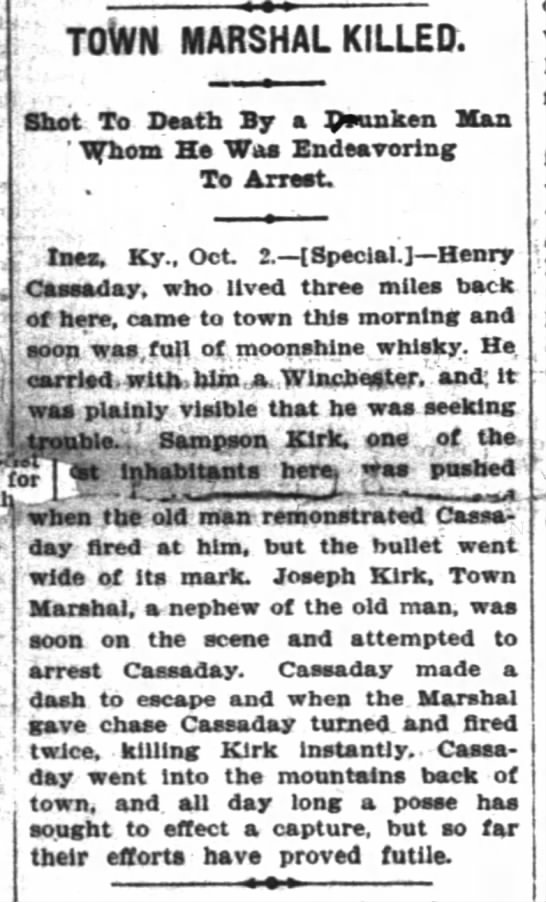Founded in 1870 and named for Congressman John Preston Martin, Martin County, Kentucky is located in Eastern Kentucky on the boarder of West Virginia.
Since its inception in 1870, Martin County, just as any county, has had its high points and its low points. One of those low points came on Sunday, October 1, 1899.What caused this low point in Martin County history? Well, it varies per source. But it involved the Cassadys and the Kirks, both of whom were very wealthy and prominent families in Martin County.
Numerous newspapers reported that, on the day before, Henry Cassady had come to town and soon became intoxicated on moonshine. The Courier-Journal in Louisville, KY states that Cassady was looking for trouble. And in that search for trouble, he fired two unprovoked shots at Sampson Kirk. The bullets missed but the incident prompted Kirk to swear out a warrant against Cassady. The warrant was given to Inez Town Marshal Joseph Kirk to serve. Marshal Kirk was the nephew of victim Sampson Kirk.
 |
| clipped from the Louisville Courier-Journal October 3, 1899 |
Marshal Kirk rode out to the home of Henry Cassady to serve the warrants, but
Cassady was not home. However on the
way back into town, Marshal Kirk met Cassady.
When he ordered Cassady under arrest, Cassady raised his Winchester
rifle and shot Kirk two to three times, killing him instantly.
However, other sources report that Cassady and Kirk met up and an old
political grudge started a quarrel between the two men. And as a result,
Cassady shot and killed Kirk.
And yet another edition the Louisville Courier-Journal, dated December 4,
1901 stated that the murder was the result of a dispute over the mortgage on a
yoke of oxen belonging to Cassady, which Kirk tried to foreclose.
And yet another source, my 11th Grade English teacher who has
ancestral connections to the Cassady’s, said that her family told her that Inez had
just installed some wooden sidewalks.
And a cow belonging to Cassady had gotten out and was destroying the
sidewalks. And Kirk was trying to arrest Cassady for it. And it resulted in Cassady killing Kirk.
Regardless of which version is the correct story, Kirk was dead and Cassady immediately fled to the mountains. A posse was formed to search for him. Since it was believed that he had fled to West Virginia, Huntington, WV detectives were also brought in on the search. A $400 reward was offered for his capture.
Nearly two years later, on May 19, 1901, United States Marshal Cunningham returned from Clay County, West Virginia, where he had arrested Cassady near Sycamore Creek.
Cassady confessed to the crime and then telegraphed Gov. Beckham for protection upon his return home.
 |
| Clipped from the Courier-Journal May 20, 1901 |
Cassady was returned home to Inez, KY, the county seat of Martin County, where the trial was scheduled to begin on May 30, 1901.
Due to so much conflicting information, I’ve omitted the trial delays. I tried to sort out the facts, but it was just too confusing and unclear. So I deleted all of that. But the trial was delayed more than once. Finally on December 2, 1901 the trial got underway. Special Judge Segraves presided over the trial.
 |
| Clipped from the Courier-Journal Dec. 4, 1901 |
The details of the trial are not known, but Cassady was found guilty and was
sentenced to two years in prison. (Two
years seemed to be the normal sentence for murder back in the day. A lot of the murder cases I have researched
have all lead to just two year sentences.)
Cassady was given a stay of judgment for sixty days pending an appeal
and was lodged in the Catlettsburg, KY jail for safekeeping during that
time. I’m assuming the appeal failed
because he was in fact sentenced to the two years.
Cassady’s trial ended up costing the
state $3500.00.
In January, 1902, according to the Louisville Courier Journal, A petition for a pardon was circulated in Martin County. Over 700 of the 900 voters in the county signed the petition.
 |
| clipped from the Courier-Journal January 18,1902 |
And in October 1902, Cassady was pardoned by Governor Beckham.
 |
| clipped from the Mt. Sterling Advocate October 8, 1902 |





No comments:
Post a Comment